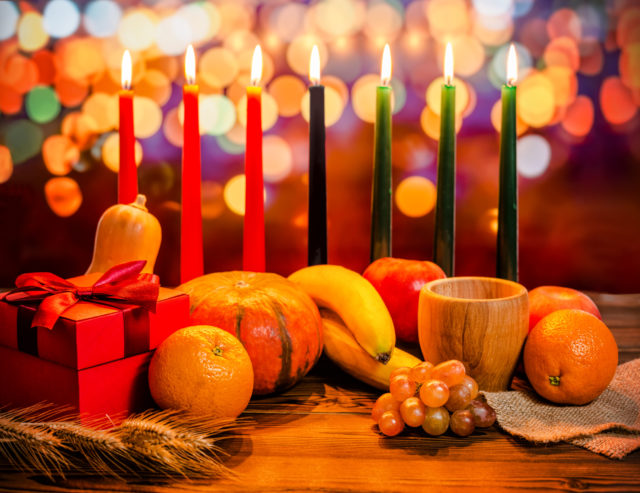
Kwanzaa holiday by iStock
Kwanzaa was created in 1966 by Dr. Maulana Karenga in an effort to form a strong community of Afro-Americans in the U.S. The holiday consists of 7 days where the family gathers and lights up one of the candles in the Kinara, the beautiful candle holder. The family then proceeds to read and discuss one of the seven principles below, which are African values that have helped build the community of African-Americans.
Here are the 7 principles explained:
- Umoja: Pronounced as “oo–MO–jah” means unity and refers to maintaining unity within the family, nation, community and the overall Afro-American race.
- Kujichagulia: Pronounced as “koo–gee–cha–goo–LEE–yah” means self-determination and refers to defining self, creativity, and speaking up.
- Ujima: Pronounced as “oo–GEE–mah” translates to collective work and responsibility by building the community as one and treating all community members as a brother or sister. Problems become everyone’s problems, so solving them is done as a team.
- Ujamaa: Pronounced as “oo–JAH–mah” means cooperative economics and refers to being able to build and maintain businesses and gain profit from them as a community.
- Nia: Pronounced as “nee–YAH” means purpose and consists of creating a collective community as an overall mission looking to restore tradition.
- Kuumba: Pronounced as “koo–OOM–bah” translates to creativity and search to increase the community’s beauty.
- Imani: Pronounced as “ee–MAH–nee” means faith. It encourages the belief in the search for what’s right and success after all the struggles.
Then night concludes with typical African dances and songs, storytelling, poetry reading and a traditional meal.
Traditional dishes symbolize a wealthy harvest. These items include yams, squash, sweet potatoes, bananas and okra. Many meals include a one-pot-stew of the following:
- Ghanaian groundnut stew.
- Curry dishes with West Indian or South African flavors.
- Philadelphia pepper pot stew.
- Jambalaya.
- Nigerian jollof rice.
- Senegalese thieboudienne.
These dishes are enjoyed with rice or couscous, buttermilk biscuits, plantains, fritters and injera.
Sharon Schweitzer and Sophie Echeverry co-wrote this post. Sharon Schweitzer, J.D., is a cross-cultural trainer, modern manners expert, and the founder of Access to Culture. In addition to her accreditation in intercultural management from the HOFSTEDE Centre and the Intercultural Communication Institute, she serves as a Chinese Ceremonial Dining Etiquette Specialist in the documentary series Confucius was a Foodie, on Nat Geo People. She is the resident etiquette expert on two popular lifestyle shows: ABC Tampa Bay’s Morning Blend and CBS Austin’s We Are Austin. She is regularly quoted by BBC Capital, Investor’s Business Daily, and Fortune. Her Amazon #1 Best Selling book in International Business, Access to Asia: Your Multicultural Business Guide, now in its third printing, was named to Kirkus Reviews’ Best Books of 2015. She’s a winner of the British Airways International Trade Award at the 2016 Greater Austin Business Awards and the 2017 New York City Big Book Award for Multicultural Nonfiction.
Sophie Echeverry is the Corporate Marketing Manager and Event Coordinator at Access to Culture. Born and raised in Colombia, she’s a 2018 graduate with a B.B.A. in International Business and Marketing from Hult International Business School in San Francisco, CA. Sophie has co-written more than 30 blogs since graduation. She’s a passionate foodie, and an avid e-scooter rider. Follow her foodie Instagram account or Connect with her on LinkedIn.

Leave A Comment